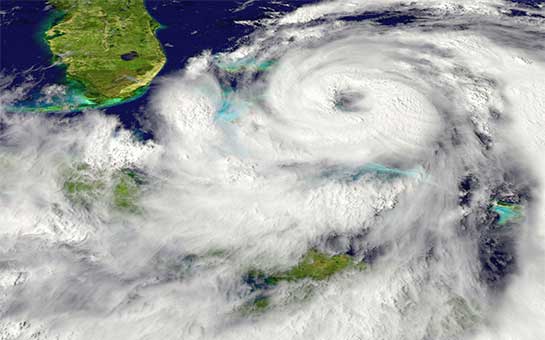Recent back-to-back Category 4 hurricanes in the Caribbean and the United States have made many people wonder: Does travel insurance cover hurricanes? Does travel insurance cover cancellation due to natural disasters? Or what does travel insurance cover when a hurricane hits?
Be aware that this kind of tropical storm has different names in different regions of the world. The term "hurricane" is used in the North Atlantic, central North Pacific, and eastern North Pacific. The term "typhoon" is used in the Northwest Pacific. The term "tropical cyclone" is used in the South Pacific and the Indian Ocean. All three of these terms refer to the same kind of storm: a rotating system of clouds and thunderstorms that forms over tropical or subtropical waters; has closed, low-level circulation; and with sustained winds of at least 74 miles per hour (about 120 kilometers per hour).
Hurricane Season and Region
Hurricane season is officially from June 1 through Nov. 30. That is six months out of the year, and it is a long time. However, August and September are the most affected months.
A typical hurricane region is the Atlantic region, which stretches from the west coast of Africa to the east coast of the United States and the Gulf of Mexico. Many countries in the Caribbean as well as Florida, Louisiana, Alabama and Texas are routinely affected.
If you are traveling to any of the possible destinations during the hurricane season, travel insurance that provides hurricane coverage is essential. Also, even if you are going to a destination outside that region, if you live in that area, travel insurance with hurricane coverage is necessary.
Hurricane Travel Insurance Eligibility
Travel insurance covers certain unexpected and unforeseen events that affect your trip.
Therefore, to be covered for a hurricane that affects your travel, you must have purchased the travel insurance before a specific hurricane is named. Once it is named, it is already predicted, and it is a foreseeable event. Therefore, if you wait until a hurricane is named, there won't be any hurricane-related coverage.
Some travel insurance plans require that you must purchase the insurance within a certain number of days that varies from seven to 21 days from initial trip deposit to get hurricane coverage. Some plans require that the hurricane must occur a certain number of days after the effective date, such as 14 days or 30 days to get coverage.
Therefore, it is best to purchase travel insurance as soon as you book your trip.
Hurricane before the trip - trip cancellation
To get any coverage for trip cancellation due to the hurricane, it must be listed as a covered reason for the trip cancellation.
Trip cancellation insurance can refund your prepaid, nonrefundable trip expenses if you have to cancel before your scheduled departure date due to the hurricane.
The common reasons for coverage are:
- The travel provider suspends services for 24 hours or more
- The insured's primary home or destination (hotel, resort or vacation rental) becomes uninhabitable
- The trip is made impossible due to extensive travel delays
In the above reasons, "uninhabitable" means substantial damage to the accommodation that would make it unfit for use by a reasonable person. However, if you are just going to face minor inconveniences such as getting a city/garden view instead of an oceanfront view or the golf course being closed due to rain, travel insurance will not provide any coverage.
If your travel provider has not, for example, canceled your cruise, but there may be cloudy weather or rain that would make your trip less enjoyable, there is no coverage.
If the cruise line or tour operator changes the itinerary to avoid the path of the hurricane, and if you want to cancel the trip due to that reason, there is no coverage. For the travel-insurance company to reimburse you, you must incur a financial loss, and as long as the travel supplier provides you with a substitute itinerary with the same value as the original trip, you must accept it, and you have not suffered a loss.
If you want to cancel the trip just because a hurricane may be in your trip's path, you will not get any coverage.
Hurricane during the trip - trip interruption
Trip-interruption coverage would reimburse the unused, prepaid, nonrefundable trip costs and additional costs for transportation back home early.
Your trip must be interrupted due to the covered reasons, as specified in the insurance policy.
If the weather was beautiful when you departed on your trip, but later the hurricane shifted direction towards your destination, trip-interruption coverage would be helpful.
You may need trip-interruption coverage if there is a mandatory evacuation ordered.
In addition to the problems at the destination, you may need to avail trip-interruption coverage due to a hurricane if your home is rendered uninhabitable. You would need to come home early in such cases.
Travel delay
To be eligible to make a trip cancellation claim due to a travel delay, many plans require that you must have lost more than 50 percent of your scheduled trip due to a covered travel delay and you have made a good-faith effort to continue your travel.
If you are on the way to the destination or back, and if there are unreasonable travel delays due to the hurricane, travel insurance can provide coverage after you are delayed for a minimum duration.
Travel-delay coverage would cover reasonable costs associated with delayed travel, such as for meals, lodging and transportation.
Other benefits
Some plans also provide additional coverages, such as for missed connection and nonmedical evacuation that would move you away from danger even before the hurricane hits.
Can't find answers to your questions?
Ask our specialists - Licensed and experienced insurance professionals in the U.S.

